Protein| vegan protein sources| protein-rich foods| High protein content
Say goodbye to all your doubts about Protein-rich foods. In this article, I will give you detailed information on protein, Vegan protein sources, protein-rich foods, and how much protein content a person should consume per day.
Protein can help repair the damaged tissues in the body and muscle loss due to the covid-19 infection, say experts.
What is Protein?
Proteins are large and complex molecules made up of thousands of smaller units called Amino acids. Protein is a part of your healthy diet, and it can also use as an energy source. A person needs 1 gm of protein per 1 kg, bodybuilders and heavy working people require 1.6 gms of protein per 1 kg, Pregnant women and feeding mothers need 2.5 gms of protein per 1 kg, and children below the age of 20 need two gms of protein per 1 kg.
There is a myth that only nonvegan foods contain high protein. But, the fact is some vegan foods have more protein than meat. Yes, that’s true! The thing is that many people are not aware of these foods.
Filling your protein requirements can be easy if you include protein-rich foods in your daily diet.
Here are the Top 6 foods that are high in protein.
1. Almonds
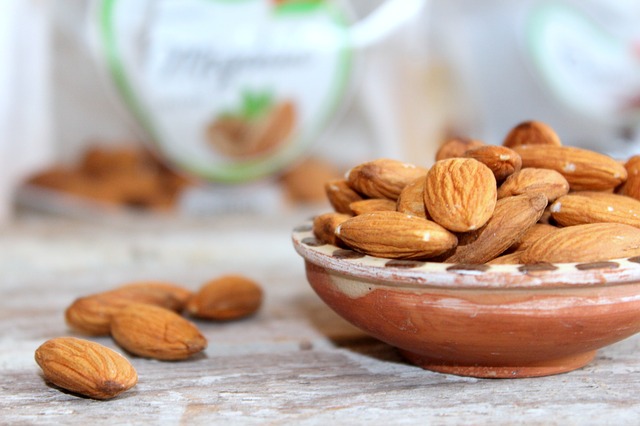
Almonds are nuts rich in vitamin E, magnesium, and potassium. Eating almonds can reduce the bad LDL cholesterol and reduce the risk of heart disease. Almonds are a bone-building food. Soaked almonds are preferable to eat than dry or roasted almonds.
Protein content:
100 gms of Almonds contain 21 gms of protein
other high protein nuts include cashews – 100 gms of cashews also provide 21 gms of protein
2. Sunflower seeds
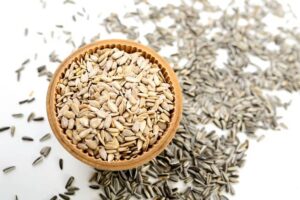
Sunflower seeds are a good source of vitamin E. Rich in antioxidants, minerals, and high nutrients. How to consume these seeds? – Sprinkle the seeds on top of salads, or roast them and make a fine powder and add it to curries.
Protein content:
100 gms of sunflower seeds provide 23 gms of protein
other high protein seeds include: Pumpkin seeds contain 19 gms of protein per 100 gms.
Watermelon seeds are also a good source of protein, they contain 34 gms of protein per 100 gms.
sesame seeds provide 18 gms of protein per 100 gms
3. Groundnuts
Groundnuts/peanuts come under legumes. These are commonly used in many dishes and are rich in protein, fat, and fiber. Eating a few roasted peanuts makes you feel full due to their high protein content. Fats present in peanuts help to lower your cholesterol levels.
Protein content:
100 gms of peanuts contain 25 gms of protein
4. Sprouts
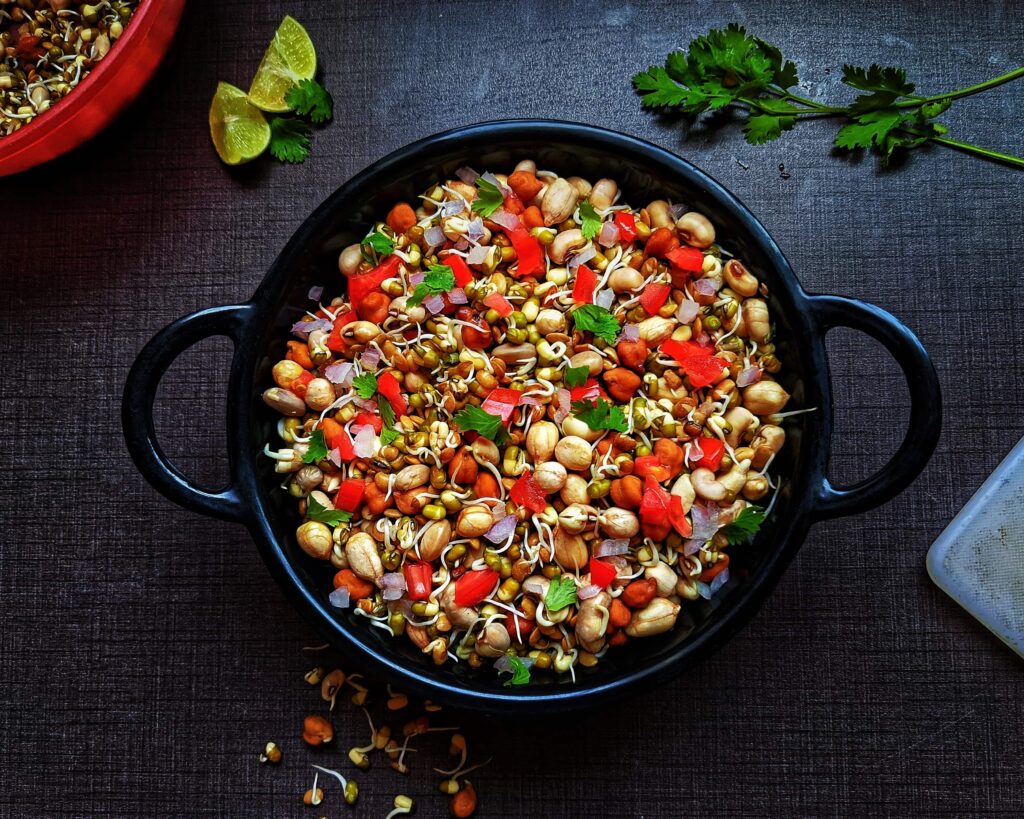
Sprouts are an excellent source of protein and contain higher levels of essential amino acids. Sprouting helps increase protein content. The proteins in sprouts may also be easier to digest.
protein content:
100 gms of sprouts contain 40 gms of protein
5. Mealmaker
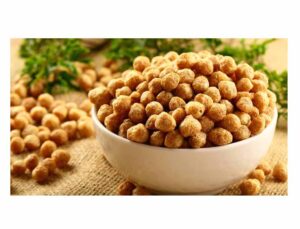
Soya chunks are also known as Mealmaker. Soya chunks are made from defatted soy flour, a by-product of extracting soya bean oil. It is a good source of protein and has the highest protein content than soya beans. Soya chunks prevent heart diseases, reduce the risk of osteoporosis, control hypertension and help in weight loss.
Protein content:
100 gms of meal maker provide 47 gms of protein
6. Spirulina
Spirulina is blue-green algae (bacteria) that grow in fresh and salt waters. This is available in both ways- capsule and powder, used as a nutritional supplement. spirulina contains a powerful plant-based protein called phycocyanin. It is extremely high in many nutrients, protein, and vitamins.
Protein content:
100 gms of spirulina contains 57 gms of protein.
Here is the table of foods that are rich in protein
| Sources | Protein value(per 100 grams) |
|---|---|
| Sesame | 18 grams |
| Pumpkin Seeds | 19 grams |
| Cashews | 21 grams |
| Almonds | 21 grams |
| Bengal gram | 21 grams |
| Red gram | 22 grams |
| Kidney Beans | 24 grams |
| Sunflower Seeds | 23 grams |
| Green gram and Blackgram | 24 grams |
| Groundnuts | 25 grams |
| Lentil | 25 grams |
| Watermelon Seeds | 34 grams |
| Soybeans | 43 grams |
| Mealmaker | 47 grams |
| Spirulina | 57 grams |
Symptoms of Protein Deficiency
- Hormonal Imbalance
- Lose Muscle
- Immunity deficiency
- Skin, hair, and nail problems
- Fatty liver
- Risk of Infections
A proper intake of protein on daily basis can overcome these deficiencies in the body.
Benefits of eating High-Protein foods
Consuming protein-rich foods offers you many benefits and also consuming too much protein has some risks. So, Some of them are mentioned below:
- Strengthens your immune system and bones
- Reduces Muscle loss
- Helps to maintain a healthy weight
- Lowers your blood pressure and supports heart health
- Promotes cell and tissue recovery
- Reduces your appetite and hunger levels.
These are the foods that are rich in protein, if you are facing protein deficiency consume these good sources of protein in your daily diet.
If you have low immunity then check out this article to know the best immunity-boosting foods.
click here – Foods that boost Immunity power
I wish you Good Health!

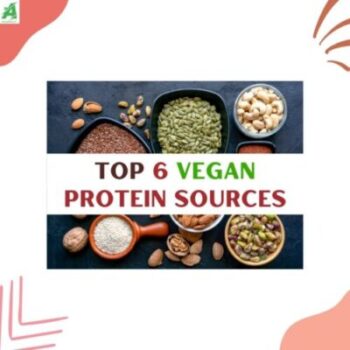
It is very valuable post.
Thank you so much!
Well-made blog
Thank you for the feedback!
very informative. valuable.
Thank you so much for your feedback!
Your post is nicely researched. I am grateful for the hard work you put into it. Thank you for posting such an educational post.
I am sure this post has touched all the internet viewers, its really really
pleasant article on building up new blog.